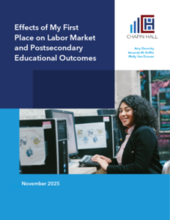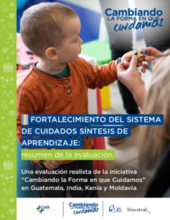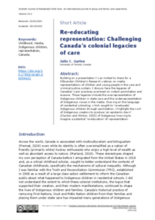This page contains documents and other resources related to children's care in the Americas. Browse resources by region, country, or category.
Displaying 11 - 20 of 3189
This article critically analyzes the complex journey undertaken by foster families who decide to adopt the children or adolescents they initially cared for on a temporary basis. Through the study of four cases, it examines the experiences and perspectives of Chilean families who chose to transform their role from foster care to adoption, presenting narratives that highlight the controversies, inconsistencies, and tensions between the logics of temporary and permanent care within the Chilean child protection system.
The Chapin Hall report evaluates the My First Place program, which provides intensive case management and fully subsidized housing to young people aging out of extended foster care in six California counties. Using data on 2,598 participants, the report finds that program completers were more likely to be employed, earned higher wages, and were more likely to enroll in and complete a semester of college compared with nonparticipants or those who did not complete the program.
Cambiar la Forma en que Cuidamos (CTWWC, por sus siglas en inglés) es una iniciativa global que promueve un cuidado familiar seguro y afectuoso para los niños.
The article describes how hundreds of children across the United States have been left behind — in foster care, with relatives, or neighbors — after their Venezuelan parents were deported, often under sweeping immigration enforcement measures.
This article highlights the experiences of Greenlandic families in Denmark whose children were taken into care following parental competency tests (FKUs), which critics say are culturally biased, conducted in Danish rather than Kalaallisut, and fa
This scoping review examined the scientific literature on youth aging out of substitute care in Canada to address challenges in estimating the country’s contribution to this growing global research field. The review identified key trends, research gaps, and future directions, emphasizing the need to better integrate existing findings to build a more cohesive Canadian evidence base.
The article reports that President Trump secured $25 million in federal funding to strengthen support for youth in foster care, particularly focusing on those aging out of the system who often face heightened risks of homelessness, unemployment, a
This article presents a comparative analysis of the Czech Republic and Colombia’s implementation of the United Nations Guidelines for Alternative Family Care. Based on secondary data, it identifies a shared adherence to the UN framework; a strong Czech system for alternative caregivers’ selection, training and support; a deep ethical commitment of Colombian foster families to ensure children’s well-being, despite limited resources; and the relevance of supporting parents at risk of having their children removed from their care and integrating the effects of unplanned migration into alternative care strategies.
Changing the Way We Care’s “Care System Strengthening Learning Synthesis: Evaluation Summary” distills lessons from care reform efforts in four countries, examining how change happened across laws, workforce, financing, monitoring, and services. It finds that evidence-based advocacy, strong government ownership, collaboration, and capacity-building were central to driving and sustaining reform across diverse contexts.
Building on a presentation invited for a Kilbrandon Children’s Research webinar on media representations of children and young people in the care and criminal justice system, this article discusses the legacies of Canadian ‘care’ practices premised on violent assimilation and erasure.







